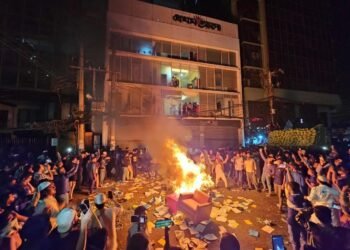Delhi chokes under a thick blanket of smog as air quality plunges to hazardous levels. Stricter measures are in place to combat the crisis, including work-from-home advisories and restrictions on vehicles.
By PC Bureau
A thick layer of smog, a hazardous mix of smoke and fog, blanketed the Delhi-National Capital Region (NCR) this morning. The air quality index (AQI) plunged to the “severe-plus” category, prompting authorities to enact stricter pollution control measures.
Worst air quality this season: According to real-time data from the System of Air Quality and Weather Forecasting and Research (SAFAR), the AQI in Delhi stood at a worrying 481 at 6 am, the worst recorded so far this season. Officials attributed this to “unfavorable” meteorological conditions in Delhi-NCR.
Understanding the AQI: An AQI between 0 and 50 is considered good, while anything above 450 falls under the “severe-plus” category, posing a serious health risk.
Stricter pollution control measures: The Centre’s air quality panel, the Commission for Air Quality Management (CAQM), has invoked Stage 4 of the Graded Response Action Plan (GRAP) for Delhi-NCR, effective from 8 am today. This adds stricter measures to those already in place under Stages 1, 2, and 3 of GRAP.
GRAP stages explained: The GRAP outlines four stages based on air quality levels:
- Stage 1 (Poor): AQI 201-300
- Stage 2 (Very Poor): AQI 301-400
- Stage 3 (Severe): AQI 401-450
- Stage 4 (Severe-plus): AQI above 450
GRAP 4 restrictions:
- Trucks restricted: Only essential goods vehicles and those using clean fuels (LNG/CNG/BS-VI diesel/electric) are allowed to enter Delhi.
- Non-essential vehicles banned: Non-essential light commercial vehicles from outside Delhi are prohibited, with exceptions for EVs, CNG and BS-VI diesel vehicles, and those carrying essential goods.
- Diesel vehicles restricted: Delhi-registered BS-IV or older diesel medium and heavy goods vehicles are banned, except for those in essential services.
- Schools closed: In-person classes are suspended for all schools except for students in grades 10 and 12.
- Construction halted: All construction activities, including public projects, are put on hold.
- Work from home: Public and private offices in Delhi-NCR are encouraged to have 50% staff work from home. The central government may also implement work-from-home options for its employees.
- Additional measures: State governments could further restrict college operations, non-essential commercial activities, and implement odd-even vehicle rationing.
Stubble burning a major culprit: Around 38% of Delhi’s air pollution this year comes from stubble burning, or farm fires, in neighboring Punjab and Haryana.
Delhi’s winter woes: The capital grapples with smog every winter as cold air traps dust, emissions, and smoke from illegal farm fires.













